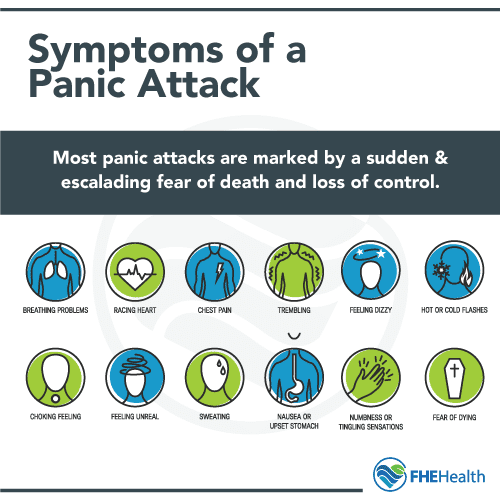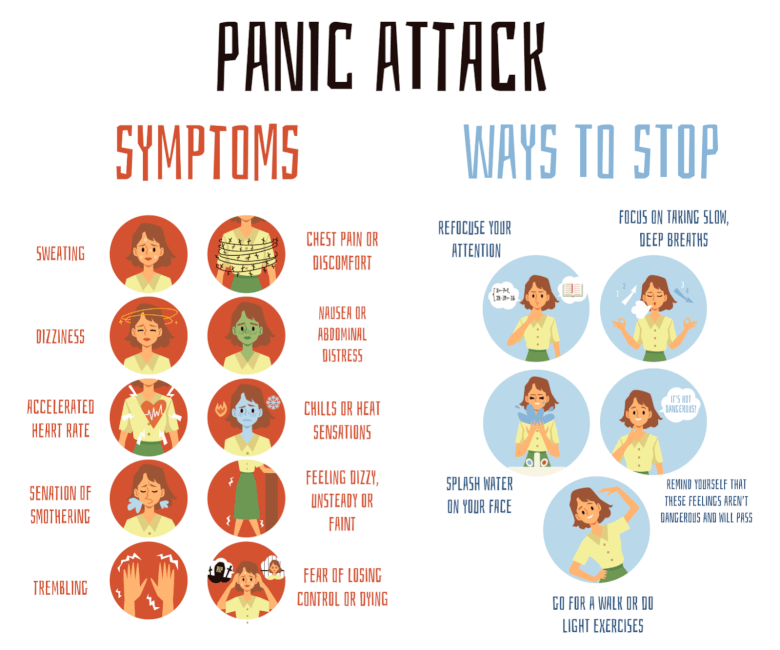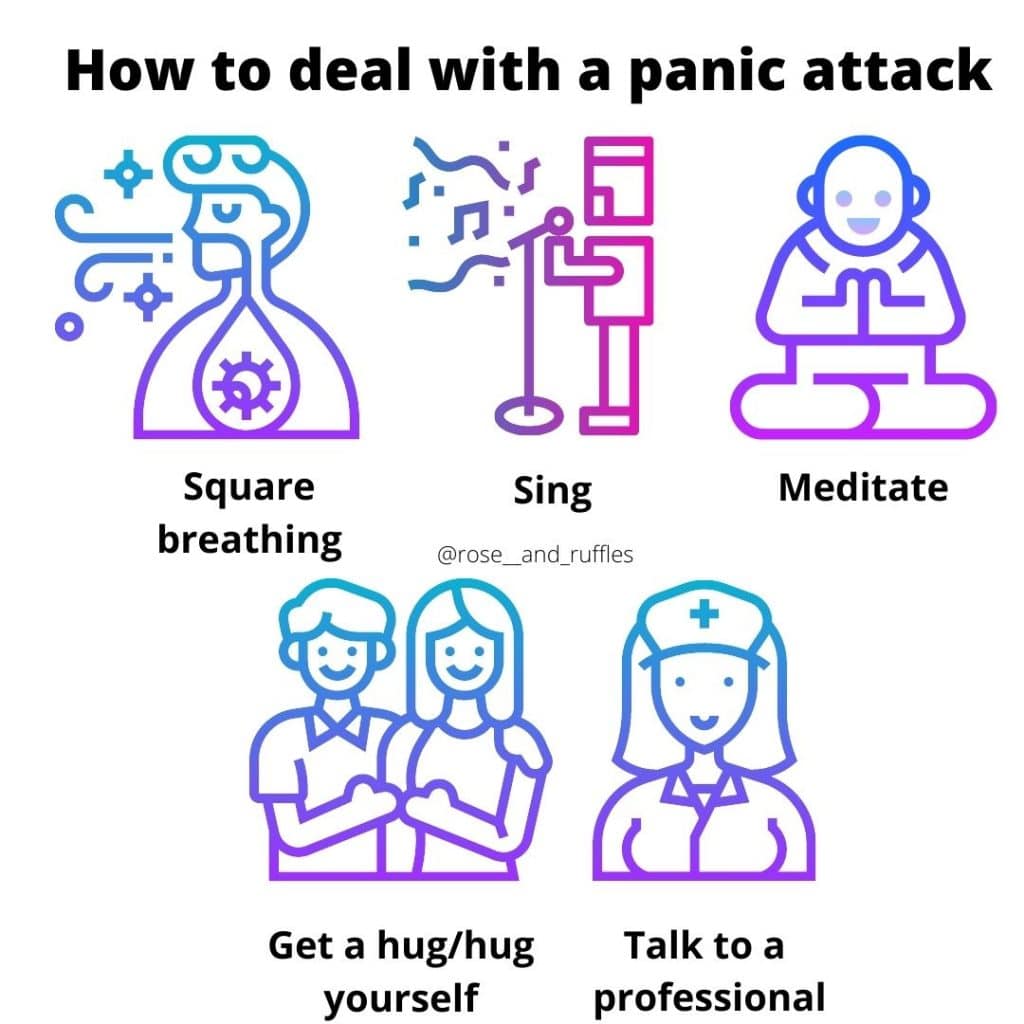How To Cope With Panic Attacks
When you have had a panic attack, you might worry about if or when you are next going to have one. This can make everyday tasks like going to school, leaving the house or meeting up with friends much more difficult. But remember, you are not alone and there is support available to help you get through this. If you are worried about when you are next going to have a panic attack, here are some things that can help you cope.
Speak to someone you trust. If you are feeling anxious or worried that you might have a panic attack, talk to friends or family. They can help you take your mind off what is making you feel panicked and support you to find the help you need. If you are struggling to say how you are feeling, you can always write your thoughts down or put them in notes on your phone if you are planning to speak to a teacher or your GP.
If you are worried about having a panic attack at school, college, or university, speak to a teacher or a member of staff. They can work with you to help you with things like finding a safe space to take some time out if you are feeling anxious or panicked.
If you feel like youre struggling to cope with everyday tasks, speak to your GP. They can listen to how you are feeling and suggest different types of treatments like therapy or counselling to help you tackle your panic attacks.
What Causes Someone To Have Panic Attacks
Researchers dont know exactly what causes panic disorder or panic attacks but believe multiple factors, including genetics and major stress, play a role. Some people have a temperament that makes them more sensitive to stress, which can be a factor. That may also be changes in parts of your brain that impact its function.
People usually start to experience panic attack symptoms in their late teens or early adult years, and women experience them more than men.
Risk factors that could increase your risk for symptoms of panic disorder include significant life stress, a family history of panic disorder, or a traumatic event.
Anxiety Attack Treatments And Relief
Anxiety attacks are generally predictable as to when they’re going to occur â usually over a 20-minute period. It’s typical to need a few minutes to calm back down afterward. Many people experience at least one anxiety attack throughout their lives, which can be managed at home. However, if these attacks become frequent and debilitating, it may be necessary to see a professional to reduce their frequency and severity.
Read Also: Which Of The Following Is True About Panic Attacks
How To Deal With Panic Attacks
A panic attack is a feeling of sudden and intense anxiety.
Panic attacks can also have physical symptoms, including shaking, feeling disorientated, nausea, rapid, irregular heartbeats, dry mouth, breathlessness, sweating and dizziness.
The symptoms of a panic attack are not dangerous, but can be very frightening.
They can make you feel as though you are having a heart attack, or that you are going to collapse or even die.
Most panic attacks last somewhere from five minutes to half an hour.
How To Handle A Panic Attack

Professor Paul Salkovskis, Professor of Clinical Psychology and Applied Science at the University of Bath, says it’s important not to let your fear of panic attacks control you.
“Panic attacks always pass and the symptoms are not a sign of anything harmful happening,” he says. “Tell yourself that the symptoms you’re experiencing are caused by anxiety.”
He says don’t look for distractions. “Ride out the attack. Try to keep doing things. If possible, it’s important to try to remain in the situation until the anxiety has subsided.”
“Confront your fear. If you don’t run away from it, you’re giving yourself a chance to discover that nothing’s going to happen.”
As the anxiety begins to pass, start to focus on your surroundings and continue to do what you were doing before.
“If youre having a short, sudden panic attack, it can be helpful to have someone with you, reassuring you that it will pass and the symptoms are nothing to worry about,” says Professor Salkovskis.
Read Also: How To Cope With Anxiety
Can Anxiety Lead To Panic
A panic attack can be a symptom of anxiety.
A person who has panic disorder may experience anxiety that they are going to have a panic attack. The uncertainty about if, or when, an attack is going to happen may lead to worry or anxiety between attacks. People may take steps to avoid situations they feel will trigger a panic attack.
For a person with panic disorder, anxiety may trigger a panic attack. The fear of having a panic attack can affect a persons behavior and ability to function in daily life.
Johns Hopkins Medicine suggests there may be a genetic factor underlying panic disorder, as it usually runs in families.
What Is Panic Disorder
Panic disorder is a type of anxiety disorder classified as someone experiencing an intense fear when there is no present danger. Often someone experiencing a panic attack will feel as though they have no control over how they feel or when the episodes occur. People who suffer multiple panic attacks develop a fear of another episode. The fear can be so great that people with panic disorder do not feel comfortable leaving their homes. This disorder can become debilitating to those who suffer from it.
People who are experiencing a panic attack may feel:
- Pounding heart rate, heart palpitations, racing heart
- Numbness or tingling
Also Check: How To Get Over Ptsd Triggers
Panic Disorder In Children
Panic disorder is more common in teenagers than in younger children.
Panic attacks can be particularly hard for children and young people to deal with. Severe panic disorder may affect their development and learning.
If your child has the signs and symptoms of panic disorder, they should see a GP.
After taking a detailed medical history the GP will carry out a thorough physical examination to rule out any physical causes for the symptoms.
They may refer your child to a specialist for further assessment and treatment. The specialist may recommend a course of CBT for your child.
Screening for other anxiety disorders may also be needed to help find the cause of your child’s panic attacks.
When To Seek Professional Help
In severe cases of panic attacks, the child or adolescent may be afraid to leave home. If you notice your child showing persisting symptoms of panic attacks, it is time to seek help from your healthcare provider.
Children and adolescents with symptoms of panic attacks should first be evaluated by their family doctor or pediatrician. If no other physical illness or condition is found as a cause for the symptoms, they might be referred to a child and adolescent psychiatrist for an evaluation.
With treatment, panic attacks can usually be stopped. Early treatment can help prevent serious complications.
Don’t Miss: What Is The Rarest Phobia
How Can I Prevent Panic Attacks
Your healthcare provider can help you identify triggers that bring on panic attacks. During psychotherapy, you learn strategies to manage triggering events and prevent an attack. You can also take these actions to lower your odds of having a panic attack:
- Cut back on caffeine.
- Talk to your doctor before taking herbal supplements or over-the-counter medications. Certain substances can increase anxiety.
Ways To Help Your Child Cope
Knowing what triggers an attack is the first step in attacking panic. Ask your child how they feel and what is making them feel anxious or stressed. Are there certain situations or places that cause them to feel panicky? This knowledge can help your child think about what they can do to cope with those situations.
During a panic attack, your child may feel like they are losing control, but there are things you can help them do to take back control and feel grounded again:
Also Check: Does Wellbutrin Help With Anxiety
Some People May Develop Panic Disorders
For many people, the feelings of panic occur only occasionally during periods of stress or illness. A person who experiences recurring panic attacks is said to have panic disorder, which is a type of anxiety disorder. They generally have recurring and unexpected panic attacks and persistent fears of repeated attacks.
Contrary To What Is Often Suggested By Media Portrayals Panic Attacks Can Look And Feel Differently For Different People

Some experience their episodes in primarily physiological ways through bodily symptoms, such as shortness of breath, dizziness, and fainting. Others report more of a mental state of rumination and worried thinking that they cannot stop . Some people find that their panic symptoms can take on feelings of derealization or depersonalization .
Many find that panic symptoms arise when feeling stuck or trapped in a physical way or an emotional way .
Still others may experience a combination or all of the above symptoms of panic at different moments.
Either way, anxiety in this form can be incredibly debilitating, lead to depression, and affect our functioning in many significant ways.
In the Diagnostic and Statistical Manual for Mental Disorders , a panic attack is characterized by four or more of the following symptoms:
- Palpitations, pounding heart, or accelerated heart rate
- Numbness or tingling sensations
- Chills or hot flushes
From this diverse list, it is apparent that there is a wide range of ways that panic can be experienced none of which are comfortable.
A frequent hallmark of panic is a persistent worry about experiencing future panic. At worst, this tendency to mentally fixate and ruminate on ones thoughts, emotions, and bodily sensations actually feeds into the cycle that creates anxiety, which in and of itself, can bring on another spike. Essentially, anxiety about feeling anxiety creates more anxiety.
Part 2 describes an unrecognized reason why people panic
Also Check: How To Help Someone With Depression And Anxiety
What Helps To Manage Panic Attacks
Panic attacks can be frightening, but there are things you can do to help yourself cope. It could help to print off these tips, or write them down, and keep them somewhere easy to find.
During a panic attack:
- Focus on your breathing. It can help to concentrate on breathing slowly in and out while counting to five.
- Stamp on the spot. Some people find this helps control their breathing.
- Focus on your senses. For example, taste mint-flavoured sweets or gum, or touch or cuddle something soft.
- Try grounding techniques. Grounding techniques can help you feel more in control. They’re especially useful if you experience dissociation during panic attacks. See our page on self-care for dissociation for more information on grounding techniques.
After a panic attack:
- Think about self-care. It’s important to pay attention to what your body needs after you’ve had a panic attack. For example, you might need to rest somewhere quietly, or eat or drink something.
- Tell someone you trust. If you feel able to, it could help to let someone know you’ve had a panic attack. It could be particularly helpful to mention how they might notice if you’re having another one, and how you’d like them to help you.
See our pages on self-care for anxiety and treatments for anxiety for more information on what could help.
Preventing A Further Attack
It may help to:
- read a self-help book for anxiety based on the principles of cognitive behavioural therapy ask your GP to recommend one
- try complementary therapies such as massage and aromatherapy, or activities like yoga and pilates, to help you relax
- learn breathing techniques to help ease symptoms
- do regular physical exercise to reduce stress and tension
- avoid sugary food and drinks, caffeine and alcohol, and stop smoking, as all they can all make attacks worse
For more help, read how to deal with panic attacks.
You May Like: What Causes Late Onset Schizophrenia
You Might Not Be That Tired Afterwards
One common symptom of panic attacks is the exhaustion that floods a person after the panic attack subsides. In more subtle panic attacks, however, this doesnt always happen.
After a really intense panic attack, the sufferer may be left feeling exhausted, Dr. Saranga says. But in mild cases, you may be able to go about your day.
How Do You Know Youre Having A Panic Attack
An anxiety or panic attack often comes on suddenly, with symptoms peaking within 10 minutes. For doctors to diagnose a panic attack, they look for at least four of the following signs: sweating, trembling, shortness of breath, a choking sensation, chest pain, nausea, dizziness, fear of losing your mind, fear of dying, feeling hot or cold, numbness or tingling, a racing heart , and feeling unusually detached from yourself.
Read Also: How Does Anxiety Medicine Make You Feel
Causes Of Panic Attacks In Children
The exact cause of panic attacks or panic disorders is not known. The following factors may have a role in the development of panic disorders .
- Changes in brain functions
The nature or temperament of a child may also play an important role in the development of panic and anxiety disorders. Children who are more sensitive to stress and negative emotions may have an increased risk for panic disorders. A few children may have panic reactions triggered by certain emotional stress situations such as school homework, fear of punishment from parents or teachers, etc.
What Causes Panic Attacks
Experts dont know why some people experience panic attacks or develop panic disorder. The brain and nervous system play key roles in how you perceive and handle fear and anxiety. Your risk of having panic attacks increases if you have:
- Family history:Anxiety disorders, including panic disorders, often run in families. Experts arent sure why.
- Mental health issues: People who have anxiety disorders, depression or other mental illness are more prone to panic attacks.
- Substance abuse problems:Alcoholism and drug addiction can increase the risk of panic attacks.
Don’t Miss: How Ptsd Affects Military Families
How To Help Others Cope With A Panic Attack
For some people, panic attacks are a daily occurrence, and for others, they are more infrequent. Regardless of the frequency, people who experience panic attacks can benefit from having support and knowing you are there.
Sitting with the person and helping them access skills they might be familiar with, like paced breathing and sensory grounding techniques, and doing them together with them can be helpful when helping a friend or loved one cope with a panic attack, says Gingrich.
Additionally, you can be the voice of the reason in the situation and remind them that they are safe and these feelings will pass. Sometimes hearing it from someone else can help provide a sense of reassurance.
What Is A Panic Attack

A panic attack is a sudden and intense feeling of terror, fear, or apprehension, without the presence of actual danger. The symptoms of a panic attack usually happen suddenly, peak within 10 minutes, and then subside. However, some attacks may last longer or may occur in succession, making it difficult to determine when one attack ends and another begins.
Anyone can experience a panic attack. An attack can sometimes be triggered by a specific event, but these attacks can also be a symptom of anxiety disorders like panic disorder or agoraphobia.
Don’t Miss: What To Say To A Depressed Friend
Always Seek Professional Advice
Always seek medical advice if you are not sure whether your symptoms, or another persons symptoms, indicate a panic attack. In an emergency, dial triple zero for an ambulance. Its important to see your doctor for a check-up to make sure that any recurring physical panic-like symptoms are not due to illnesses, including:
Complications Of Panic Disorder
Panic disorder is treatable and you can make a full recovery. But it’s best to get medical help as soon as you can.
If you do not get medical help, panic disorder can escalate and become very difficult to cope with.
You’re more at risk of developing other mental health conditions, such as agoraphobia or other phobias, or an alcohol or drug problem.
Having panic disorder may affect your ability to drive. The law requires you to inform the Driver and Vehicle Licensing Agency about a medical condition that could impact your driving ability.
Visit GOV.UK for further information about driving with a disability or health condition.
Also Check: How To Control Panic Attacks
Types Of Panic Attacks
One way that panic attacks have been characterized into different types is as follows:
- Spontaneous or uncued panic attacks occur without warning or out of the blue. No situational or environmental triggers are associated with the attack. These types of panic attacks may even occur during sleep.
- Situationally bound or cued panic attacks occur upon actual or anticipated exposure to certain situations. These situations become cues or triggers for a panic episode. For example, a person who fears enclosed spaces may experience a panic attack when entering or thinking about entering an elevator.
- Situationally predisposed panic attacks dont always occur immediately upon exposure to a feared situation or cue, but the person is more likely to experience an attack in such situations. For example, a person who has a fear of social situations but who does not experience a panic episode in every social situation, or who experiences a delayed attack after being in a social environment for an extended period of time.